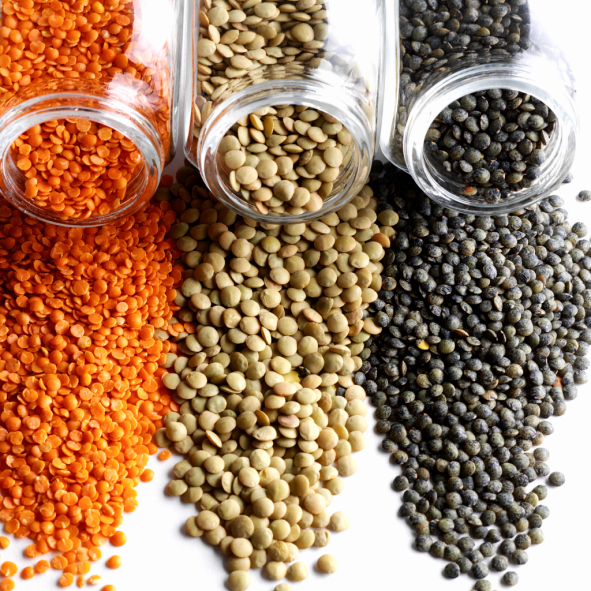Beans Health Benefits: Eat Dry Beans, Peas, and Lentils for Heart Health
 Dried beans, peas, and lentils include kidney beans, navy beans, chickpeas, Great Northern beans, black-eyed peas, split peas, and lima beans.
Dried beans, peas, and lentils include kidney beans, navy beans, chickpeas, Great Northern beans, black-eyed peas, split peas, and lima beans.
Dry beans, peas and lentils are a very economical option for adding protein and nutrients to your diet with a 1-pound costing an average of $0.15 per serving for dry beans and between $0.35 to $0.50 per serving depending on brand for canned beans.
Beans Health Benefits: Dry beans, peas, and lentils are highly nutritious
— Contain almost twice the protein of whole grains and all nine essential amino acids
— Provide both soluble and insoluble fiber
— Low in sodium. If prepared without added salt contain they contain almost no sodium. Canned options are higher in sodium. Select “low sodium” or “no added salt” options. Draining and rinsing canned beans, peas and lentils reduces sodium content by 41%.
— Contain almost no fat. Fat content depends on what is added during preparation.
— A plant source of iron. Plant iron sources are a little harder for the body to absorb. To boost iron absorption, combine with foods contains vitamin C.
— Rich source of magnesium, zinc, and potassium.
— Gluten-free
LDL-P: How to lower small, dense LDL particles

The development of heart disease is associated with many risk factors. LDL cholesterol level is often used to determine if preventative treatment is needed, such as medication to lower levels in an effort to prevent heart disease.
However, research indicates LDL cholesterol alone is not necessarily a good determinant of risk. LDL particles vary in their content, size, and density. Not all LDL particles impact heart disease risk in the same way.
Light, fluffy versus small, dense LDL particles
LDL particles come in two main sizes: Large, fluffy particles and small, dense particles.
I had these particles explained to me once by picturing dump trucks on a highway. This helped me visualize the role of these different particles. Hopefully it’ll help you…
Picture the large, fluffy particles to be five large trucks transporting a full load on the highway. Now picture small, dense particles to equal twenty small, trucks with a full load on the highway. It takes twenty small trucks to carry the same load five large trucks can transport.
The more “trucks” (ie particles) in your system, the greater your heart disease risk.
Hence the reason it is beneficial to have large, fluffy particles (ie trucks that can carry a lot in fewer loads) versus small, dense particles (ie more trucks to carry the same load).
Continue reading
Omega 3 & Common Fish Oil Myths

Have you had a chance to review some of the Omega 3 information I’ve shared? If not, here are links to some resources:
How much omega 3 do you need to lower cholesterol?
Top Omega 3 Sources to Lower Cholesterol
Now, let’s get a another point of view from Dr. Fred Sancillio.
Dr. Sancilio is a development scientist. He has published over 20 articles in peer-reviewed scientific journals and has presented to scientists in conferences around the world. He started his career as a physical and analytical chemist in the Research Division of Hoffmann-LaRoche, Inc. Dr. Sancilio earned his M.S. and Ph.D. degrees in Physical and Analytical Chemistry from Rutgers University.
According to Dr. Sancilio, if you take a fish oil supplement to help lower your LDL cholesterol, you’re wasting your money. The same may hold true if you think there’s not much difference between the various types of fish oil and omega-3 supplements on store shelves except perhaps the capsule sizes (and the size of the smelly, fishy belches some cause after you take them).
So, let’s dive into a Q & A discussion different aspects of omega 3 and what Dr. Sancilio refers to as myths…
Common myths about cholesterol, foods and fats
 Guest post provided by Rebecca S. Reeves, DrPH, RD, FADA
Guest post provided by Rebecca S. Reeves, DrPH, RD, FADA
2013 is shaping up to be a year of prevention, which should have you thinking about how well you are treating your own heart. If you are trying to maintain healthy cholesterol levels, or your doctor has said that you need to lower your cholesterol, you are probably trying to keep a close eye on your diet.
This does not mean that you must avoid all your favorite foods. What it might take is substituting different ingredients in a recipe or stir-frying a food rather than deep fat frying it.
Learning the difference in the types of fat that we eat and where these fats are found in our food is also important to controlling the cholesterol levels in our blood. Taking precautions today could prevent a heart condition tomorrow.
Here are some of the most common myths and facts that you should know.
Continue reading
Heart Disease Risk and Cholesterol Levels
 Do you take statin medication? If so, when did your doctor recommend you being statins? Was it when your lab results found your LDL cholesterol levels to be elevated?
Do you take statin medication? If so, when did your doctor recommend you being statins? Was it when your lab results found your LDL cholesterol levels to be elevated?
LDL cholesterol has been the measure used to determine when lipid lowering therapy is needed…and statins are often the therapy started.
Research is beginning to question if LDL is the best measure for knowing if cholesterol treatment is warranted to reduce heart disease risk.
Continue reading
Why is HDL Cholesterol Considered to be ‘Good’?
 There are some very interesting questions coming out regarding the benefits of HDL cholesterol.
There are some very interesting questions coming out regarding the benefits of HDL cholesterol.
High HDL cholesterol has always been encouraged because people with higher HDL cholesterol levels have a reduced risk for heart disease. If you have low HDL cholesterol levels it’s likely that your doctor recommended you to boost levels through diet and exercise or by taking niacin supplements. This is due to the long held belief that HDL cholesterol reduces heart disease risk by “picking up” artery clogging cholesterol from circulation.
A new study utilizing modern genetic testing is challenging this theory, finding that there may not be a direct cause-and-effect relationship between reduced heart disease risk and high HDL cholesterol levels. Study findings indicate the high HDL levels themselves may not be protective on their own. These high HDL levels may be an indicator of something else reducing heart disease risk.
Continue reading



